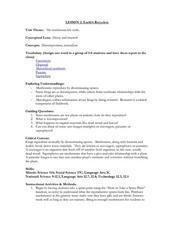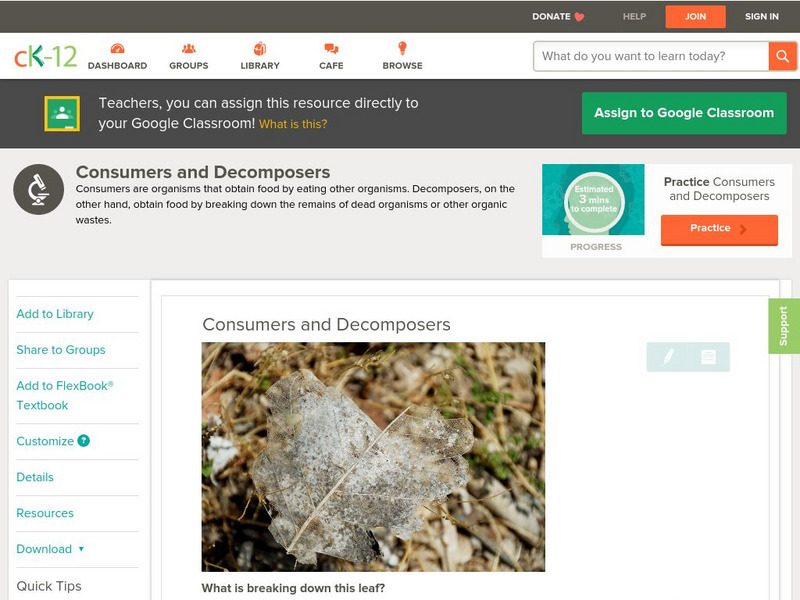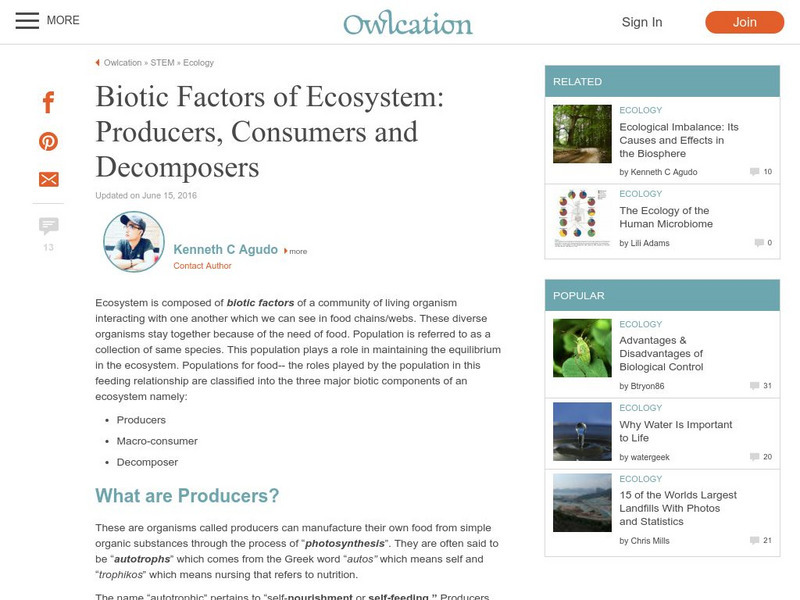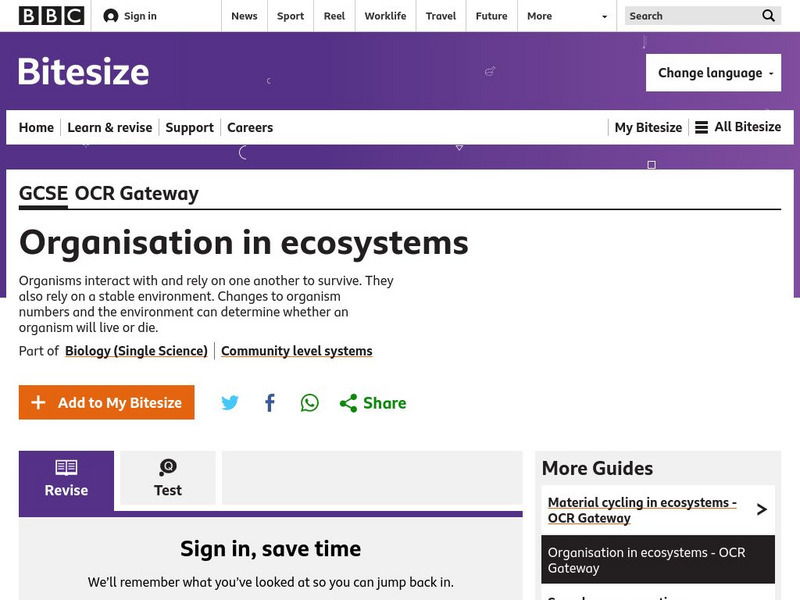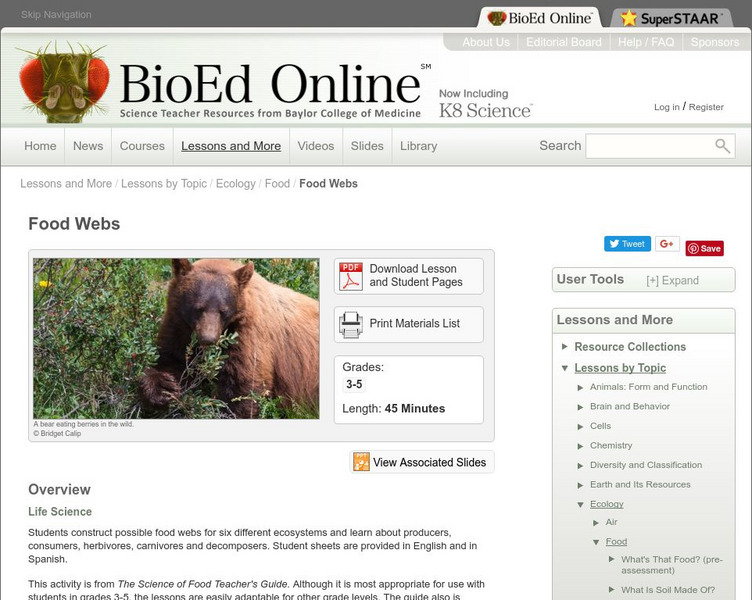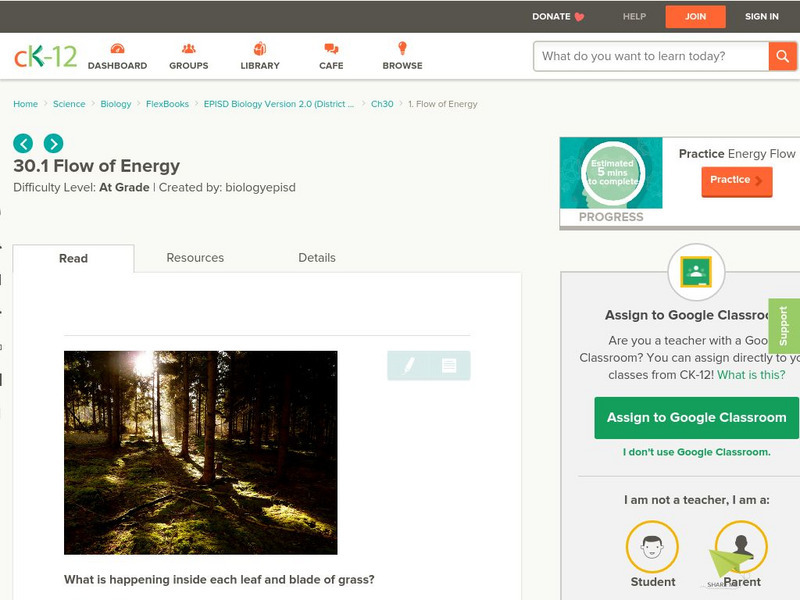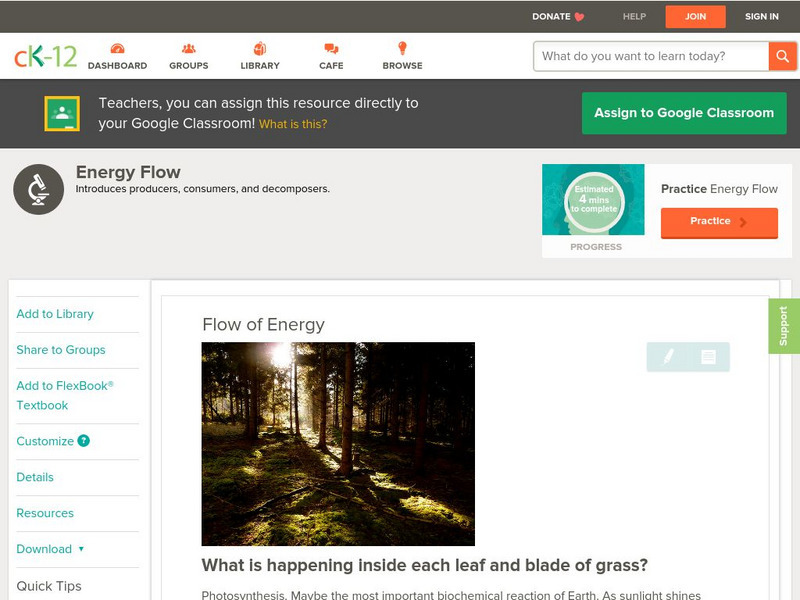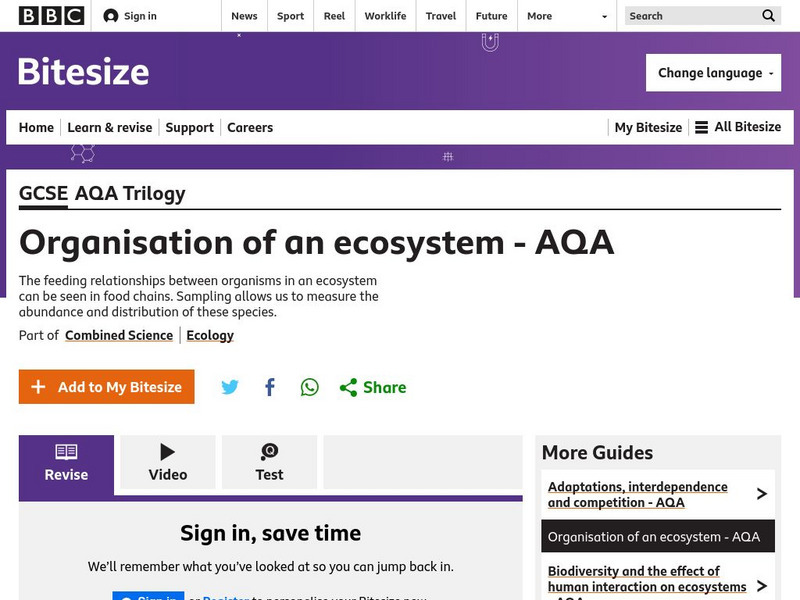Curated OER
Ecological Citizen
Students examine the interconnectedness of living and non-living things that constitute an ecosystem. They examine fallen trees,insects, living trees, leaves, food webs, and forests. They conduct various activities and write poems about...
Curated OER
Earth's Recyclers
Middle schoolers work together in groups to report on different topics related to decomposition. They answer questions and share their answers with the class. They discuss any topic that is unclear.
Curated OER
Dissolved Oxygen
Students discuss the relationships between dissolved oxygen in a stream, stream temperature, organic waste loads, and stream conditions by studying and using a model of dissolved oxygen in the stream.
Science Education Resource Center at Carleton College
Serc: Investigation a Food Web: Producers, Consumers, and Decomposers
Being field scientists, students will explore a wooded area in their community and journal about their observations. Students will collect information about producers, consumers, and decomposers in the ecosystem. They will then construct...
CK-12 Foundation
Ck 12: Life Science: Consumers and Decomposers
[Free Registration/Login may be required to access all resource tools.] Producers make their own food through photosynthesis. But many organisms are not producers and cannot make their own food, but must get their energy from other...
CK-12 Foundation
Ck 12: Life Science: 12.17 Consumers and Decomposers
Learn the difference between consumers and decomposers in the ecosystem.
CK-12 Foundation
Ck 12: Episd: Consumers and Decomposers
[Free Registration/Login may be required to access all resource tools.] Based upon the way organisms acquire their energy students will understand how to group them as consumers, decomposers or producers.
Sheppard Software
Sheppard Software: Parts of the Food Chain: Producers, Consumers, Decomposers
Learn how scientists classify different types of organisms in an ecosystem or in a food chain by their role and function as either a producer, a consumer, or a decomposer. Then play a game that tests your understanding of these important...
Other
Hub Pages: Biotic Factors of Ecosystem: Producers, Consumers and Decomposers
An ecosystem is composed of biotic factors of a community of living organisms interacting with one another which we can see in food chains/webs. These diverse organisms stay together because of the need of food. Population is referred to...
TeachEngineering
Teach Engineering: Got Energy? Spinning a Food Web
Students learn about energy flow in food webs, including the roles of the sun, producers, consumers and decomposers in the energy cycle. They model a food web and create diagrams of food webs using their own drawings and/or images from...
Science Struck
Science Struck: Difference Between Food Chain and Food Web
Explains the characteristics of food chains and food web; the different levels of producers, consumers, and decomposers; and the differences between food chains and food webs. Includes charts and a Venn diagram comparing the two.
BBC
Bbc: Gcse Bitesize: Organization in Ecosystems
This lesson focuses on food chains in ecosystems, including levels of consumers, decomposers, and a list of common words used with food chains and their definitions. It also provides a link to an assessment.
National Geographic
National Geographic: Coral Reef Food Web
Explore the food web in a coral reef with these illustration. Identify the consumers, producers, and decomposers that are located within this ecosystem. Site includes illustration exploring the different food chains as well as questions...
BioEd Online
Bio Ed Online: Food Webs
Students construct possible food webs for six different ecosystems as they learn about the roles of producers, consumers, herbivores, carnivores and decomposers.
CK-12 Foundation
Ck 12: Episd Biology: Flow of Energy
[Free Registration/Login may be required to access all resource tools.] Students will study how energy flows through an ecosystem and learn about photoautotrophs and chemoautotrophs, the role of decomposers, and of consumers.
TeachEngineering
Teach Engineering: Go With the Energy Flow
Students learn about energy and nutrient flow in various biosphere climates and environments. They learn about herbivores, carnivores, omnivores, food chains and food webs, seeing the interdependence between producers, consumers and...
Utah Education Network
Uen: Biological Energy Food Chain Practice
After reviewing the roles of consumers, producers and decomposers, you'll create your own food chains using pictures from magazines. The site also has 18 questions to see if you can identify the ecologic role played by various organisms.
Planet Pals
Planet Pals: The Food Chain
Omnivores, herbivores and carnivores are waiting for you. The food chain comes to life at this friendly site.
CK-12 Foundation
Ck 12: Biology: Flow of Energy
[Free Registration/Login may be required to access all resource tools.] Describes how energy flows through an ecosystem.
BBC
Bbc: Gcse Bitesize: Organization of an Ecosystem Aqa
This lesson focuses on the organization of an ecosystem. The feeding relationships between organisms in an ecosystem can be seen in food chains. Sampling allows us to measure the abundance and distribution of these species. It provides...
CK-12 Foundation
Ck 12: Fifth Grade Science: Life Science: The Flow of Energy in an Ecosystem
A module that explains what an ecosystem is and how energy and matter move through them. Students will look at the different roles of plants and animals and at ecological relationships in food chains and food webs.
Science Education Resource Center at Carleton College
Serc: Mn Step: The Flow of Energy: Balancing Ecosystems
A lesson outlining activities for a science unit where students can learn about the relationships and the flow of energy within an ecosystem. These include predator and prey, hosts and parasites, and consumers, producers, and decomposers.
Science Struck
Science Struck: Tropical Rainforest Energy Pyramid and Its Importance
Explains the roles of consumers, producers, and detrivores or decomposers and how energy flows through the different levels of the energy pyramid of a tropical rainforest.
PBS
Nh Pbs: Nature Works: Ecosystems
How would you define an ecosystem? Check out this educational resource to learn more about the living and nonliving parts of different ecosystems.



